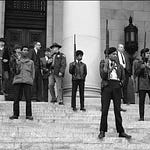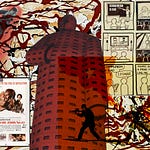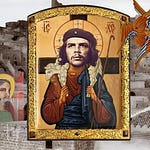Overview: The episode explored the political and artistic affiliations of Frida Kahlo and Salvador Dali, examining how their personal identities and controversial beliefs have shaped their legacies. The discussion delved into the surrealist artistic movement, including its internal contradictions and the influence of the occult on female artists like Remedios Varo and Ithell Colquhoun. The conversation concluded by examining how occult beliefs and pseudoscience influenced Nazi ideology, highlighting the complex interplay between rationality, mysticism, and political power in the early 20th century.
Main points:
The Erasure of Frida Kahlo's Politics
Max and Shaenah discussed the political and artistic affiliations of Frida Kahlo, highlighting her commitment to communism and her complex relationship with Trotsky. They explored how Kahlo's political beliefs have been overshadowed by her personal identity and sexuality in modern discourse.
Salvador Dali's Controversial Legacy
The life and work of Salvador Dali, his artistic methods, political beliefs, and controversial behavior. They explored Dali's use of the Paranoiac-Critical Method, his neutral stance during the Spanish Civil War, and his eventual rejection of surrealism due to his fascist sympathies and racist views.
Surrealism's Contradictory Art and Politics
Max discussed the surrealist artistic movement, highlighting its internal contradictions between its artistic goals and Marxist affiliations. He noted the movement's uneasy relationship with politics, given their admiration for figures like Marquis de Sade and their interest in the occult, which was influenced by broader societal changes such as the impact of the Industrial Revolution and capitalism.
Surrealism, Women Artists, and the Occult in Art
The influence of the occult on Surrealism, particularly among female artists like Remedios Varo, Leonora Carrington, and Ithell Colquhoun. They explored how these artists incorporated occult themes into their work, often facing challenges due to the male-dominated nature of the movement. Max discussed Ithell Colquhoun’s surrealist art techniques, including her invention of "parsimage" and her connection to the occult through the Hermetic Order of the Golden Dawn. Shaenah shared insights about Remedios Varo, highlighting her technical approach to art and her synthesis of science and nature.
Nazi Pseudoscience and Occultist Influence
The historical convergence of pseudoscience, occult beliefs, and eugenics, particularly how these ideas influenced Nazi ideology. They explored how Madame Blavatsky's theories on ancient Aryan races and human evolution were later distorted by German occultists, leading to the Nazis' bizarre and irrational beliefs about selective breeding and supernatural abilities.
The Irrationalism of Nazi Ideology
To conclude, Max and Shaenah discussed the influence of occult beliefs on Nazi ideology, arguing that it was a significant factor in shaping their bizarre and irrational worldview. They explored how Nazi ideas were rooted in occultism, paganism, and ethno-nationalism, contrasting with the common narrative that portrays Nazi Germany as a society based on rationality and science.The conversation ended with a reflection on the broader historical context of industrialization, capitalism, and the search for meaning in the aftermath of World War I.
Links:
https://www.historynet.com/obsessed-with-the-occult/
https://www.historynet.com/nazi-witches/
https://leftychan.net/leftypol/src/1622232510872-2.pdf
https://www.artsy.net/article/artsy-editorial-artist-embraced-occult-defied-surrealists












